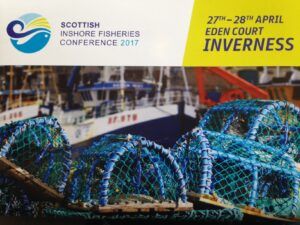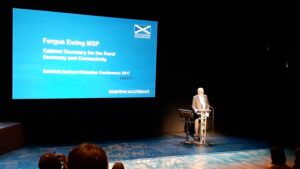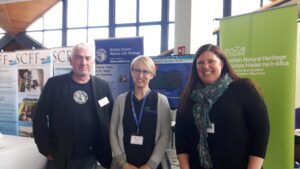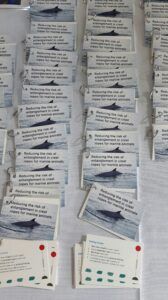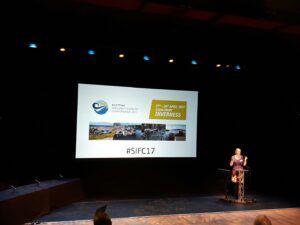A few weeks ago, inshore fishermen, policy makers, NGOs, scientists and more came together to discuss Scotland’s inshore fisheries at the fourth Scottish Inshore Fisheries Conference. The need for continued collaboration between all marine stakeholders to work towards a positive and sustainable future of inshore fisheries management was clear.
The conference kicked off with a look at the EMFF funded Scottish Inshore Fisheries Integrated Data System (SIFIDS) project. The project aims to look at new technologies and processes to improve data collection within Scotland’s inshore fisheries. It intends to reduce the burden of reporting on fishermen, whilst also developing a robust understanding of fishing activity, the economic value of the sector and its importance within local communities. By improving the evidence base that fisheries management and marine spatial planning are based on, the research hopes to enhance sustainability and foster resilience within Scotland’s inshore fishing communities.
Opening the second day of the conference, Cabinet Secretary for the Rural Economy and Connectivity Fergus Ewing, reminded all of the need to continue working together to complete Scotland’s network of Marine Protected areas. He also took the opportunity to announce the launch of a
new collaborative project between the Scottish Creel Fisherman’s Federation, Hebridean Whale and Dolphin Trust, Whale and Dolphin Conservation, Scottish Natural Heritage, Scottish Marine Animal Stranding Scheme and British Divers Marine Life Rescue. The project aims to raise awareness of potential marine mammal entanglements in creel lines and to develop and encourage best practice among the industry to reduce and avoid entanglements. Pocket sized and A4 best practice wallets were available for the first time at the conference. The Cabinet Secretary also alluded to recent events in Loch Carron, highlighting the work being done to gather evidence before reaching a verdict.
The looming implications of Brexit also dominated the minds of many. In a dedicated session to discuss the Scottish Government’s perspective, Caro Cowan, Marine Scotland’s Post EU Referendum Co-ordinator, gave an update on the Brexit process, reiterating Scottish Government’s active work to ascertain the right to access/legislate Scottish waters all the way out to the 200 nautical mile limit. Marine Scotland staff in the audience gave assurances that there won’t be a ‘blank slate’ on Day 1 of Brexit, with EU legislation carried over with the Great Repeal Bill. This includes the Habitats and Birds Directives that require legal protection of marine habitats and species within Special Areas of Conservation and Special Protection Areas (SPAs) with Scotland’s Marine Protected Area network.
Delegates were also treated to a view of inshore fisheries management from Norway’s Fisheries Directorate, where there is a thriving i nshore cod fishery. Norwegian colleagues shared their four underlying principles of inshore fisheries management – research, regulatory measures, monitoring and surveillance, enforcement and sanctions – without any of which, the fishery would collapse. The session showcased the use of smart phone apps to record fishery data offline, and introduced the ‘Triangle of Compliance’, that highlighted the need to work at all levels and use a range of tools (i.e. the full force of law, deterring by detection, raising awareness of issues) to successfully increase compliance with fisheries management measures.
During the concluding plenary session chaired by Daniel Owen, Stewart Crichton (Orkney Fisheries Society) shared concerns from the processing sector about loss of labour post-EU, while and Anne-Margaret Anderson (SWFPA) pointed to the importance of well-resourced and monitored Marine Protected Areas to help protect Scotland’s marine environment. Alasdair MacLeod (creel fisherman) took the opportunity to remind the audience of the urgent need to take proactive measures to revive the now depleted stock of inshore fisheries. Reflecting from personal experience, he urged all fishers to take measures to be more sustainable (i.e. fishing to demand) and encouraged the use of scientific research to trial new approaches to manage inshore stocks. This prompted comment from the audience about the need for a strategic vision for Scotland’s inshore fisheries.
In all, marine conservation was not far off the agenda. As Graham Black, the new Director of Marine Scotland reminded in his closing speech – successful fisheries rely on a protected marine environment.

